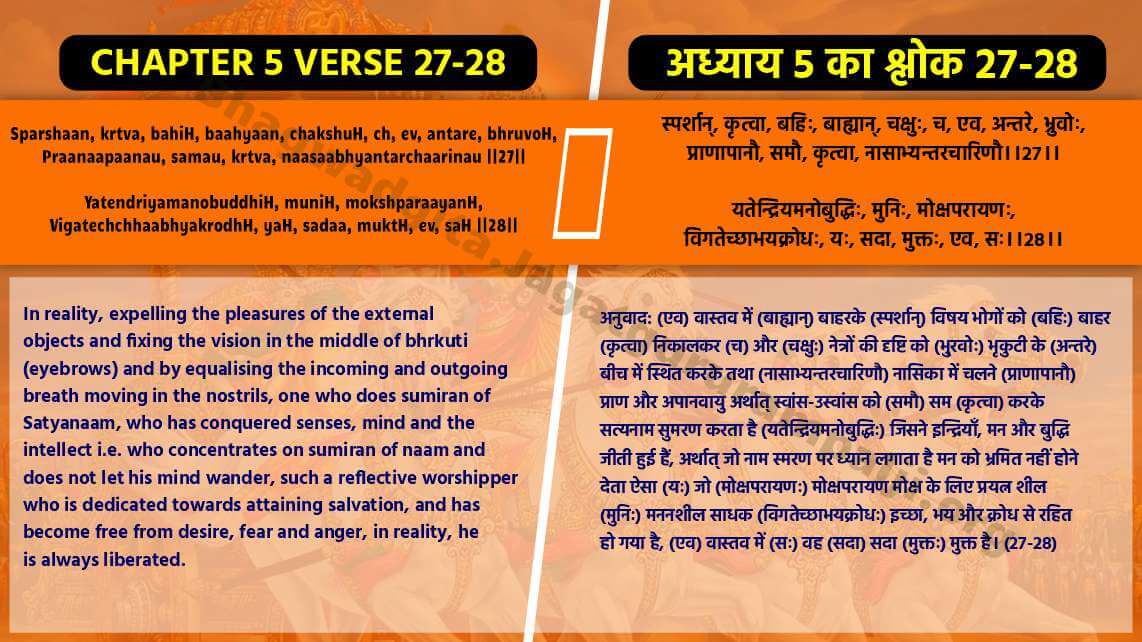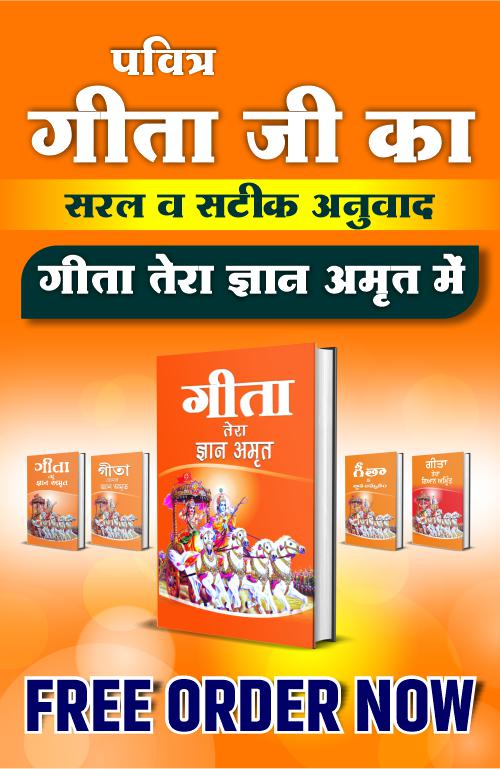
Sparshaan, krtva, bahiH, baahyaan, chakshuH, ch, ev, antare, bhruvoH,
Praanaapaanau, samau, krtva, naasaabhyantarchaarinau ||27||
YatendriyamanobuddhiH, muniH, mokshparaayanH,
VigatechchhaabhyakrodhH, yaH, sadaa, muktH, ev, saH ||28||
Translation: (Ev) in reality (baahyaan) external (sparshaan) pleasures of objects (bahiH) out (krtva) expelling (ch) and (chakshuH) vision (bhruvoH) bhrkuti / eyebrows (antre) fixing in the middle of and (naasaabhyantarchaarinau) moving in the nostrils (praanaapaanau) incoming and outgoing breath (samau) equal (krtva) doing, does sumiran of Satnaam (yatendriyamanobuddhiH) who has conquered the senses, mind and intellect i.e. one who concentrates on sumiran of naam and does not his mind wander, such (yaH) who (mokshparaayanH) dedicated towards attaining salvation (muniH) reflective worshipper (vigatechchhaabhyakrodhH) free from desire, fear and anger (ev) in reality (saH) he (sadaa) always (muktH) is liberated. (27-28)
Translation
In reality, expelling the pleasures of the external objects and fixing the vision in the middle of bhrkuti (eyebrows) and by equalising the incoming and outgoing breath moving in the nostrils, one who does sumiran of Satyanaam, who has conquered senses, mind and the intellect i.e. who concentrates on sumiran of naam and does not let his mind wander, such a reflective worshipper who is dedicated towards attaining salvation, and has become free from desire, fear and anger, in reality, he is always liberated.
Important: In Gita Adhyay 5 Shlok 29, the narrator of Gita, Brahm-Kaal, is saying that those ignorant people who are dependant on my sadhna considering me the master of all and the all-happiness giving God, they remain devoid of the peace obtained after attaining the Purna Parmatma; which means they are not completely liberated. Their peace ends and they experience various kinds of sufferings.
स्पर्शान्, कृत्वा, बहिः, बाह्यान्, चक्षुः, च, एव, अन्तरे, भ्रुवोः,
प्राणापानौ, समौ, कृत्वा, नासाभ्यन्तरचारिणौ।।27।।
यतेन्द्रियमनोबुद्धिः, मुनिः, मोक्षपरायणः,
विगतेच्छाभयक्रोधः, यः, सदा, मुक्तः, एव, सः।।28।।
अनुवाद: (एव) वास्तव में (बाह्यान्) बाहरके (स्पर्शान्) विषयभोगोंको (बहिः) बाहर (कृत्वा) निकालकर (च) और (चक्षुः) नेत्रोंकी दृष्टिको (भु्रवोः) भृकुटीके (अन्तरे) बीचमें स्थित करके तथा (नासाभ्यन्तरचारिणौ) नासिकामें चलने(प्राणापानौ) प्राण और अपानवायु अर्थात् स्वांस-उस्वांस को (समौ) सम (कृत्वा) करके सत्यनाम सुमरण करता है (यतेन्द्रियमनोबुद्धिः) जिसने इन्द्रियाँ, मन और बुद्धि जीती हुई हैं, अर्थात् जो नाम स्मरण पर ध्यान लगाता है मन को भ्रमित नहीं होने देता ऐसा (यः) जो (मोक्षपरायणः) मोक्षपरायण मोक्ष के लिए प्रयत्न शील (मुनिः) मननशील साधक (विगतेच्छाभयक्रोधः) इच्छा, भय और क्रोध से रहित हो गया है, (एव) वास्तव में (सः) वह (सदा) सदा (मुक्तः) मुक्त है। (27-28)
विशेष:- गीता अध्याय 5 मंत्रा 29 में गीता बोलने वाला ब्रह्म काल कह रहा है कि जो नादान मुझे ही सर्व का मालिक व सर्व सुखदाई दयालु प्रभु मान कर मेरी ही साधना पर आश्रित हैं, वे पूर्ण परमात्मा को प्राप्त होने से मिलने वाली शान्ति से वंचित रह जाते हैं अर्थात् उनका पूर्ण मोक्ष नहीं होता। उनकी शान्ति समाप्त हो जाती है तथा नाना प्रकार के कष्ट उठाते रहते हैं।
